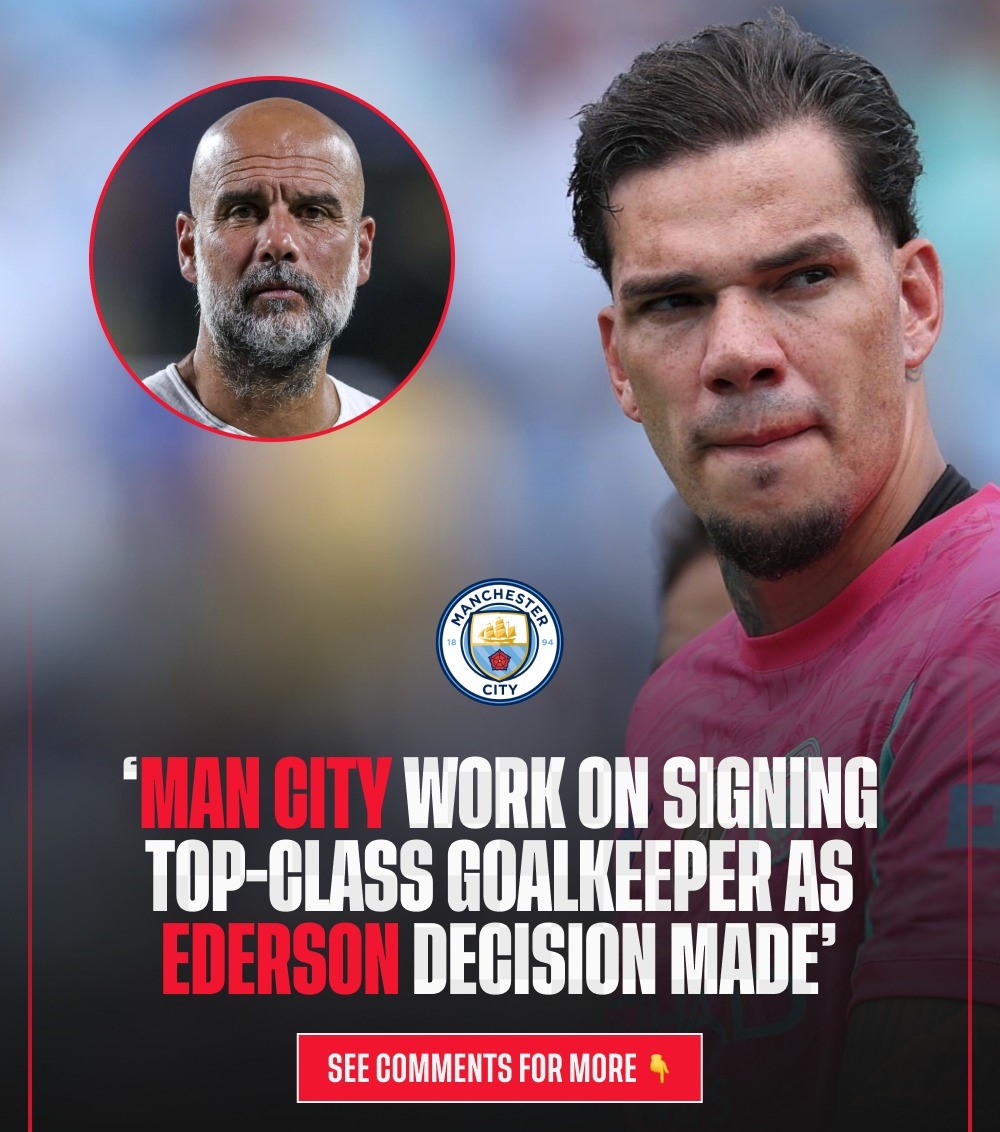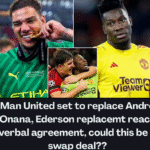Manchester City’s Goalkeeper Revolution: The Ederson Era Comes to an End

Manchester City are preparing for one of the most significant positional changes in recent memory as they actively work on securing a top-class goalkeeper to replace Ederson, who appears increasingly likely to depart the Etihad Stadium. The Brazilian shot-stopper’s potential exit represents the end of an era for Pep Guardiola’s side, with the club now facing the complex challenge of finding a worthy successor to one of the Premier League’s most accomplished goalkeepers.
The Ederson Legacy: Seven Years of Excellence
Ederson’s tenure at Manchester City has been nothing short of transformational. Since arriving from Benfica in 2017 for approximately £35 million, the Brazilian has redefined what it means to be a modern goalkeeper in Guardiola’s system. His unique combination of shot-stopping ability, distribution skills, and tactical intelligence has made him an integral component of City’s success over the past seven seasons.
The 31-year-old’s statistics speak volumes about his contribution to the club’s achievements. With over 330 appearances across all competitions, Ederson has been instrumental in City’s collection of multiple Premier League titles, FA Cups, League Cups, and their historic Champions League triumph in 2023. His ability to initiate attacks from the back, coupled with his exceptional range of passing, has made him the archetypal Guardiola goalkeeper.
Beyond the trophies, Ederson’s influence on City’s playing style cannot be overstated. His willingness to play out from the back, even under intense pressure, has enabled City to maintain their possession-based approach while providing an additional creative outlet. His long-range distribution has frequently caught opponents off guard, creating scoring opportunities that traditional goalkeepers might never have attempted.
The Brazilian’s shot-stopping credentials are equally impressive. His reflexes, positioning, and ability to make crucial saves in high-pressure situations have earned him recognition as one of the world’s elite goalkeepers. His performances in major finals, including the Champions League final against Inter Milan, demonstrated his capacity to deliver when it matters most.
The Saudi Arabia Factor: A Lucrative Exit Route
The emergence of Saudi Arabia as a major force in global football has created new dynamics in the transfer market, particularly for established players seeking lucrative final contracts. Ederson’s situation exemplifies this trend, with the Brazilian reportedly attracting “massive” interest from Saudi Pro League clubs willing to offer substantial financial packages.
According to industry sources, Saudi clubs are prepared to submit offers in the £40-50 million range for Ederson’s services, representing a significant return on City’s original investment. For a player entering the final year of his contract, such valuations demonstrate the premium placed on world-class goalkeeping talent in the Saudi market.
The financial incentive for Ederson personally is equally compelling. Saudi clubs have demonstrated their willingness to offer salary packages that far exceed what European clubs can provide, potentially allowing the Brazilian to secure his family’s financial future while still competing at a high level. The tax-free nature of Saudi salaries further enhances the attractiveness of such opportunities.
Former England goalkeeper Paul Robinson, speaking on Football Insider’s Inside Track podcast, acknowledged the reality of the situation: “If that huge fee comes in from a Saudi club and allows him to move on [this summer], then that might be invested into signing another goalkeeper.” This pragmatic assessment reflects the understanding that City, like many clubs, must balance sentiment with financial reality.
City’s Strategic Response: Planning for the Future
Manchester City’s hierarchy has demonstrated characteristic foresight in preparing for Ederson’s potential departure. Rather than being caught off guard by the Brazilian’s exit, the club has already begun the process of identifying and pursuing suitable replacements. This proactive approach reflects the lessons learned from previous transfer windows and the importance of maintaining squad continuity.
The club’s recruitment team, led by Director of Football Txiki Begiristain, has reportedly compiled a shortlist of potential targets who could seamlessly integrate into Guardiola’s system. The emphasis is on finding a goalkeeper who can not only match Ederson’s shot-stopping ability but also possess the technical skills and tactical understanding necessary to function as an auxiliary outfield player.
Former Manchester United chief scout Mick Brown revealed in December that City would listen to “big” offers for Ederson as part of a major squad overhaul. This strategic approach suggests that the club views the goalkeeper’s potential departure as an opportunity to refresh their squad while generating funds for other areas of improvement.
The timing of this potential transition is particularly significant given City’s broader plans for squad rejuvenation. With several key players entering the latter stages of their careers, the club is actively working to ensure smooth transitions that maintain their competitive edge while adapting to changing tactical requirements.
The Ortega Conundrum: Capable but Not Elite
Stefan Ortega’s presence at Manchester City presents both an opportunity and a challenge as the club considers Ederson’s replacement. The German goalkeeper has proven himself to be a capable deputy, stepping in admirably during Ederson’s absences and demonstrating reliable shot-stopping ability and decent distribution skills.
However, as Paul Robinson astutely observed, there remains a significant gap between Ortega’s capabilities and those of the world’s elite goalkeepers. “Ortega has stepped in at times and could do a job, but is he at the top level of the likes of Alisson, Manuel Neuer, Thibaut Courtois or Jan Oblak?” Robinson questioned. “I’m not sure Ortega is in that bracket.”
This assessment reflects the harsh reality of elite football, where marginal differences in quality can determine success or failure. While Ortega possesses the fundamental skills required for Premier League goalkeeping, his limitations in terms of distribution range, command of the penalty area, and ability to influence City’s build-up play make him unsuitable as a long-term first-choice option.
The German’s role is therefore likely to remain that of a reliable backup, providing competition and cover while allowing City to invest in a more dynamic first-choice goalkeeper. This arrangement would mirror the club’s approach in other positions, where established internationals serve as deputies to world-class starters.
Target Profile: The Search for Excellence
Manchester City’s search for Ederson’s replacement is guided by specific criteria that reflect both Guardiola’s tactical requirements and the club’s ambitions for continued success. The ideal candidate must possess exceptional shot-stopping ability, outstanding distribution skills, strong aerial presence, and the mental fortitude to perform in high-pressure situations.
Paul Robinson emphasized the caliber of goalkeeper City must target: “You have to sign a good goalkeeper to replace him. If you look what City have done with their recruitment, they’re taking that squad on to the next level. If Ederson is to leave, then it’s a big gap to fill.”
The comparison to goalkeepers like Alisson, Manuel Neuer, Thibaut Courtois, and Jan Oblak provides insight into the standard City are seeking. These players represent the pinnacle of modern goalkeeping, combining traditional shot-stopping excellence with the technical and tactical sophistication required for possession-based football.
Physical attributes also play a crucial role in City’s assessment process. The ideal candidate must possess the height and reach necessary to command the penalty area while maintaining the agility required for Guardiola’s high defensive line. The ability to quickly transition from defensive actions to attacking contributions is equally important.
Financial Implications: The Cost of Excellence
The financial aspects of replacing Ederson present both challenges and opportunities for Manchester City. While the potential sale of the Brazilian could generate significant funds, the cost of acquiring a suitable replacement has increased dramatically in recent years.
Robinson highlighted this economic reality: “If you’re going to go for a top-class goalkeeper at that level, it’s going to cost you a lot of money to be able to replace him.” The inflation in goalkeeper transfer fees reflects the position’s increased importance in modern football and the scarcity of truly elite options.
Recent high-profile goalkeeper transfers provide context for the expected investment. Chelsea’s acquisition of Kepa Arrizabalaga for £71 million in 2018, though ultimately unsuccessful, demonstrated the premium placed on goalkeeping talent. More recently, successful moves like Alisson’s £67 million transfer to Liverpool have shown the value of investing heavily in the position.
City’s financial position, strengthened by their commercial success and potential Ederson sale, provides flexibility in the transfer market. The club’s ability to offer competitive salaries and project long-term success makes them attractive to potential targets, potentially offsetting some of the transfer fee requirements.
Tactical Considerations: Guardiola’s Goalkeeper Philosophy
Pep Guardiola’s approach to goalkeeping extends far beyond traditional shot-stopping requirements. His philosophy demands that goalkeepers function as the first line of attack, capable of initiating moves with precise distribution and comfortable operating outside their penalty area when necessary.
This tactical evolution has fundamentally changed how elite clubs evaluate goalkeeping talent. Technical ability with the ball at feet, decision-making under pressure, and understanding of positional play have become equally important to traditional goalkeeping skills. The successful integration of these elements requires extensive coaching and a specific mentality.
Ederson’s mastery of these requirements has set the standard for Guardiola’s goalkeeper expectations. His ability to find teammates with pinpoint accuracy over various distances, coupled with his composure when pressed by opposing forwards, has become integral to City’s tactical identity. Any replacement must demonstrate similar capabilities to maintain tactical continuity.
The defensive line’s positioning and movement patterns are also influenced by the goalkeeper’s abilities. Guardiola’s preference for high defensive lines requires goalkeepers willing to act as sweeper-keepers, intercepting through balls and providing an additional passing option for defenders. This role demands courage, timing, and excellent reading of the game.
Market Analysis: Available Options
The current goalkeeper market presents both opportunities and challenges for Manchester City’s recruitment team. While several talented options exist, the combination of quality, availability, and tactical suitability limits the realistic targets.
Established international goalkeepers like Gianluigi Donnarumma at Paris Saint-Germain, Marc-André ter Stegen at Barcelona, and Mike Maignan at AC Milan represent the ideal profile but would require substantial transfer fees and may be unavailable due to their clubs’ reluctance to sell.
Younger prospects with significant potential, such as Diogo Costa at Porto or Giorgi Mamardashvili at Valencia, offer long-term value but may require time to adapt to Guardiola’s demands and the Premier League’s intensity. The risk-reward calculation for such signings requires careful consideration.
The Premier League’s homegrown player requirements add another layer of complexity to City’s decision-making process. While goalkeepers are less affected by these regulations than outfield players, the potential advantages of signing English or academy-developed talent cannot be ignored.
The Defensive Restructure: Beyond Goalkeeping
Ederson’s potential departure occurs alongside broader defensive changes at Manchester City. The recent exit of Kyle Walker to Burnley has created additional positional requirements, with the club reportedly targeting Newcastle’s Tino Livramento as a replacement.
This simultaneous restructuring of defensive positions presents both challenges and opportunities. While managing multiple significant changes increases complexity, it also allows for holistic planning that considers how different defensive components interact within Guardiola’s system.
The £80 million price tag reportedly demanded by Newcastle for Livramento demonstrates the premium placed on defensive talent in the current market. Combined with the expected investment in a new goalkeeper, City face substantial expenditure to maintain their defensive standards.
These financial requirements may influence the club’s approach to other positions, potentially affecting their ability to strengthen in midfield or attack. The interconnected nature of squad planning means that decisions regarding Ederson’s replacement will have implications throughout the team.
International Implications: Brazil’s Goalkeeping Future
Ederson’s potential move to Saudi Arabia would have significant implications for his international career with Brazil. The Seleção’s coaching staff and fans have grown accustomed to his contributions, particularly his distribution abilities and penalty-saving prowess.
The competitive nature of Brazil’s goalkeeping pool, including talents like Alisson Becker and newer prospects, means that maintaining international relevance requires consistent high-level performance. The perceived quality of the Saudi Pro League compared to Europe’s top competitions could influence Ederson’s national team prospects.
However, the Brazilian Football Confederation’s pragmatic approach to player selection suggests that strong performances, regardless of league, could maintain his international status. The precedent set by other South American players who have successfully balanced Saudi careers with international duties provides encouragement.
Long-term Vision: City’s Goalkeeping Evolution
Manchester City’s approach to replacing Ederson reflects a broader philosophy of continuous improvement and adaptation. Rather than simply seeking a like-for-like replacement, the club may view this transition as an opportunity to evolve their goalkeeping approach while maintaining their tactical identity.
The advancement of goalkeeping techniques, training methods, and tactical understanding means that Ederson’s eventual replacement may bring different strengths and capabilities. This evolution could influence City’s defensive structure and attacking patterns, potentially unlocking new tactical possibilities.
The club’s commitment to developing young talent through their academy system also factors into long-term planning. While no current academy goalkeeper appears ready for first-team responsibilities, the investment in youth development ensures future options and provides valuable experience for emerging talents.
Conclusion: The End of an Era and New Beginnings
Ederson’s potential departure from Manchester City represents the end of one of the most successful goalkeeper tenures in the club’s history. His contributions to City’s transformation into a global powerhouse cannot be overstated, from his role in tactical innovation to his crucial saves in defining moments.
The challenge now facing City is finding a worthy successor who can maintain their standards while potentially bringing new dimensions to their play. The financial resources available, combined with the club’s recruitment expertise and Guardiola’s tactical vision, provide confidence that a suitable replacement can be found.
The broader implications of this transition extend beyond individual performance to questions of squad evolution, tactical adaptation, and financial management. How City navigate these challenges will significantly influence their prospects for continued success in domestic and European competitions.
As the summer transfer window progresses, the resolution of Ederson’s situation will likely catalyze other moves and set the tone for City’s approach to the coming season. The success of this transition will be measured not only in immediate performance but in the club’s ability to maintain their position at the pinnacle of world football while adapting to changing circumstances.
The goalkeeper position’s evolution continues to reflect broader changes in football, with technical ability, tactical understanding, and mental resilience becoming increasingly important. Manchester City’s handling of this transition will provide valuable insights into the modern requirements for elite goalkeeping and the challenges faced by clubs seeking to maintain competitive advantages in an ever-evolving sport.















